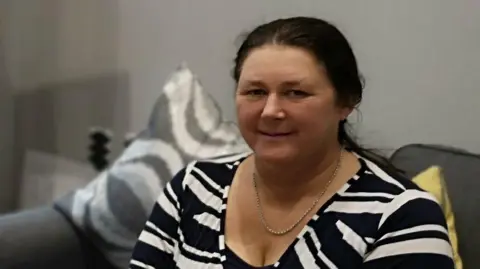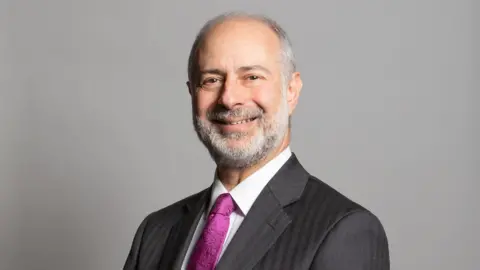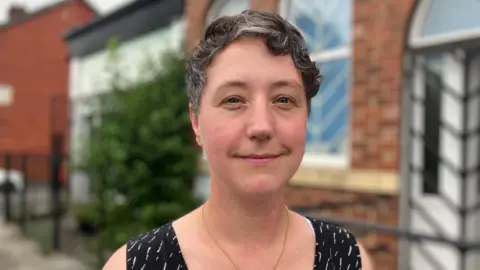'I will die a Traveller and be proud of it'
 Leeds GATE
Leeds GATEAs Irish Travellers, Kim Moloney's family have lived a nomadic lifestyle for generations, calling caravans and wagons pulled up on parks and roadsides their home.
However, after Travellers parked on a green space in Leeds, an MP has called for increased powers that would see communities moved from public land within hours.
"It makes me feel like I am not wanted in this world," Ms Moloney said.
The 55-year-old is no stranger to eviction, having spent much of her life moving from place to place around Leeds.
"You can get a lot of hassle," she said.
She described moments including people banging on the caravan door as her family sat down for tea.
"When I was a little girl, I saw all these men in the fields throwing bricks at the windows of the caravans and one injured a child," she said.
"The police did nothing about it, 'they should not be here' they said. That is how travellers have to live."
Nomadism is not illegal in the UK but travellers can only park on authorised sites which can be either council-owned or privately-owned with a licence.
Unauthorised encampments, including roadside or greenspaces, can be considered a breach of civil law.
Ms Moloney, who has been awarded an MBE for her work as a campaigner for Travellers' rights, said over the years her community had been treated "like dirt" because of their way of life.
She said she felt Travellers "lived life under surveillance" and described being followed around shops by people who seemed suspicious of her and her family.
Ms Moloney said members of the Traveller community had taken their own lives because of the negative attitude of society towards them.
"We are people, we didn't come from space, we are human like anybody else, why should we be treated any differently because we live roadside?" she said.
 UK Parliament
UK ParliamentHowever, Fabian Hamilton, MP for Leeds North East, said residents in his constituency are being "constantly disrupted" by encampments near Roundhay Park.
He said residents had seen fence posts being cut down and "human waste being left undealt with".
"What we need is legislation that allows orders granted instantly, so that removal can take place within hours, if not a day or two, rather than days and weeks," he said.
"It is far too slow right now, people have no problem with Travellers but they should not be in public parks because it stops others using the park.
"Most of all they should not be destroying parts of public property so that other users cannot enjoy them."
Ellie Rogers, the CEO of Leeds Gypsy and Traveller Exchange (GATE), which supports the Traveller and Romany Gypsy communities, said more powers were the "last thing" authorities needed.
"We have enough powers and they are used very frequently," she said.
The charity has created a negotiated stopping policy with Leeds City Council but Ms Rogers said it was not being "actively implemented".
The policy means Gypsies and Travellers will work with the local authority and may be allowed to remain on land for up to 28 days, as long as the site is left clean.
Toilets and skips are provided under the policy, in what Ms Rogers said was a financially beneficial arrangement for authorities.
"There are clear up costs and court fees you do not see, it saves a lot of money," she said.
 BBC / Elizabeth Baines
BBC / Elizabeth BainesThere are 3,000 Gypsy and Traveller families across the country who have nowhere to stay, according to Leeds GATE, with a further 10,000 living on land without permission.
"This is an issue of homelessness and social injustice," Ms Rogers said.
"The negotiated stopping policy is a really good tool we could be using and we are not using it as well as we could."
Ms Rogers also called for more permanent sites for Gypsy and Traveller families.
"Camps do not disappear," Ms Rogers said.
"They just pop up somewhere else, you are not making that issue go away, you are just moving it."
A permanent site is similar to a housing estate but instead of houses, the plot has a building with a bathroom, kitchen and space to park caravans.
Families pay rent, council tax and utilities.
Cottingley Springs, a site in the Gildersome area of Leeds, opened in 1969 for Gypsy and Traveller families and has 41 plots.
Kidacre Park opened in Hunslet in 2019, but has a temporary 10-year licence in place, because it is on the proposed route of the high speed rail line HS2.
Jessica Lennox, executive member for housing at Leeds City Council, said the authority "considers the potential for negotiated stopping for all unauthorised Traveller encampments".
She said the council "recognised the challenges where encampments cause loss of amenities and disruption to local settled communities".
The council would continue to look for other suitable land for encampments, she added.
'Better management'
West Yorkshire Police said it had a "long-standing commitment to engaging with travelling communities".
Alison Lowe, the deputy mayor for policing and crime in West Yorkshire, said "better management of the situation" was needed and added that this included using negotiated stopping sites.
"More enforcement will only further marginalise our Traveller community, and I will continue to work with the police and our partners to ensure we apply the right approach," she said.
Ms Moloney now lives at Cottingley Springs but continues to fight for the rights of Travellers.
Rather than powers to move people on she wants more suitable sites for families to live at to be created.
"People should not leave mess lying around. If authorities helped Travellers more, they might have solved the problem a long time ago," she said.
"You have to understand, Travellers are never going to give up their culture.
"I'll die a Traveller and be proud of it."
Listen to highlights from West Yorkshire on BBC Sounds, catch up with the latest episode of Look North.
